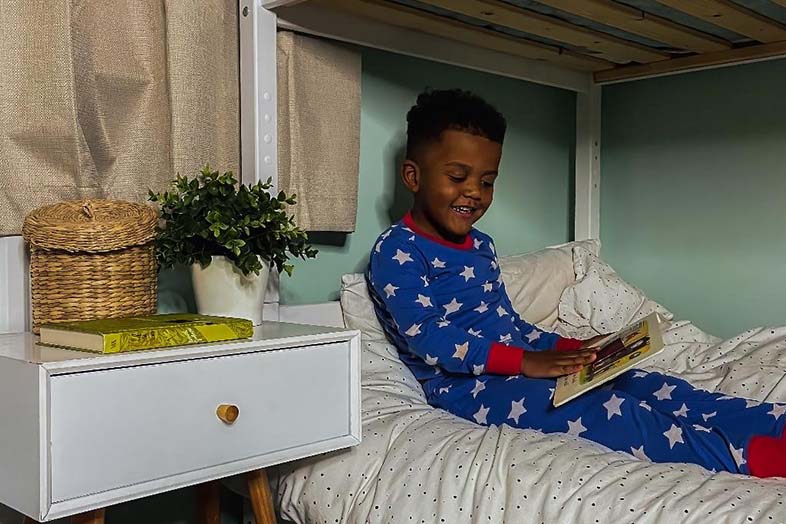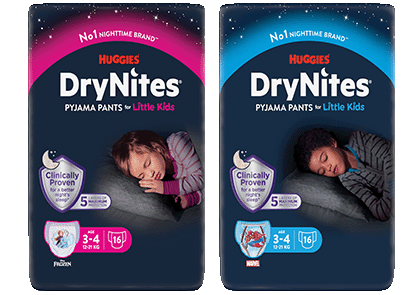Bedwetting, also called enuresis, is a medical condition where children have accidents during the day when they can’t get to the loo in time, or they wet the bed at night. Some children master being dry sooner than others but for some, it’s a condition that continues into older years. Here’s what you need to know.
Bedwetting is a phase, not a problem
Remember, your child is just going through a phase—one of many developmental phases that all children go through. They may not necessarily have a problem and may grow out of it just as quickly as it came on.
Some children take a little longer to grow out of bedwetting. Others master toilet training quickly, only to have a patch of enuresis later on. Whatever pattern your child follows, remember it’s not their fault and they will soon be able to stay dry at night, with the right help and support.
If, however, your child is still wetting the bed when they are a little older than is typical, you may want to have a look at ways to cope and support your child.
Night-time accidents at 3-5 years old
Most children of this age will have some accidents from time to time, especially if they are so engrossed in play that they forget to use the toilet.
This may be easy enough to cope with at home but if your child is going to stay at a relative’s house, or going for a sleepover with a friend, you might want to pop them into DryNites® Pyjama Pants at night, or give them to the adult at the home they will be sleeping at. Your child will feel happier and more confident and their host won’t have to change the sheets!
Bedwetting at school age

If your child is at school during the day and having accidents at night, the worst thing about it is that they miss valuable sleep—and so do you. Try to avoid this happening too much by supporting your child to wear DryNites® Pyjama Pants at night or put a DryNites® Bed Mat on their bed so that the sheets don’t all have to be changed just when everyone is tired and grumpy at night.
One other tricky area is school trips. Your child probably won’t want their friends to know they may have an accident at night, so you’ll need to be discreet. You may want to let one of the trip leaders know that they are not always dry at night and you can then make sure that they have DryNites® Pyjama Pants in their case, so that they can slip them on in the loo just before bedtime. Another solution is to place them in a sleeping bag, ready for sleep time. This also allows them to change in privacy.
ERIC’s top tips for school age children wetting the bed
- “Reassure your child that wetting the bed is common and the chances are they won’t be the only one on the trip who has wetting accidents.”
- “Be prepared. There are lots of products that can help such as pads, pull-ups, sheet covers, special underwear and sleeping bag liners.”
- “If your child is taking a sleeping bag, they could hide a Pyjama Pant or pad at the bottom.
- “If their underwear or pyjamas are also inside the sleeping bag, they can get dressed for bed in private.”
Older child and teenage bedwetting

ERIC comments: “It’s common for older children to deny their bedwetting and not want to talk about it with you. Hiding wet sheets can be a way of coping with the embarrassment they feel. It’s happening outside their conscious control, and they may secretly worry about it.”
“There are ways to support your child to manage their wetting such as keeping a diary of wet versus dry nights to see if they can spot a pattern.”
“If treatments aren’t working, ask your doctor or nurse to make a referral for your child to be seen by a specialist.”
Can bedwetting ever be a problem you need to look into?
If your child is still wetting the bed after the age of five, you may want to have a chat with your GP to see if you need to explore the reasons. They can rule out physical problems, such as a problem with the structure of your child’s body, or other medical conditions such as diabetes.
Supporting your child can make a huge difference
While your child is going through this time, which they may find embarrassing or upsetting, make sure you spend plenty of time with them chatting through their thoughts and feelings and talking about how you are going to tackle it together.
Explain that it happens to lots of people and ask around in your family to see if others also had bedwetting incidents—you’ll find that it’s more common than you think!
Remember that your child can cope better if they feel supported and that you can turn to the DryNites® range to help you all get a good night’s sleep, which helps you all cope much better!




 your parenting partner
your parenting partner